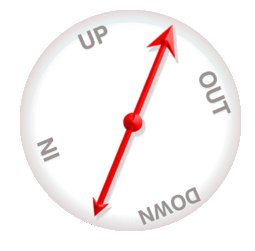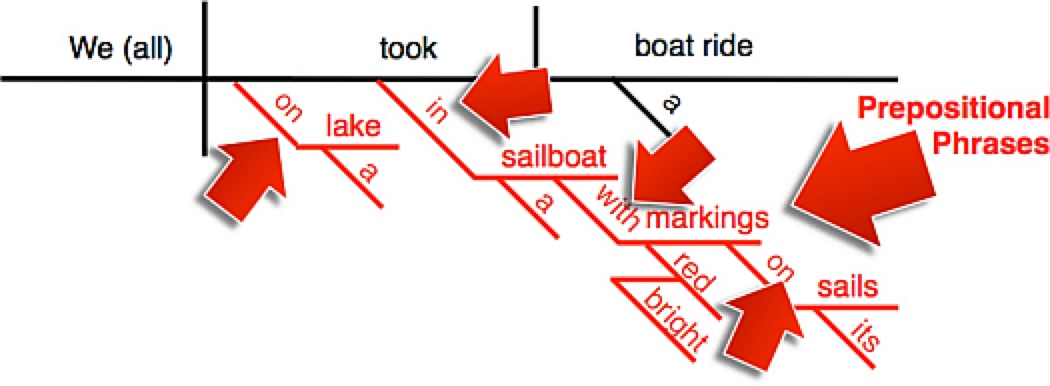
Karl J Sherlock
Associate Professor, English
Email: karl.sherlock@gcccd.edu
Phone: 619-644-7871
 A preposition is a kind of modifier, acting as an adjective or an adverb, locating something in time and space, modifying a noun, or telling when or where or under what conditions something happened.
A preposition is a kind of modifier, acting as an adjective or an adverb, locating something in time and space, modifying a noun, or telling when or where or under what conditions something happened.
Prepositions are combined with their objects to build prepositional phrases;objects are always nouns or words and phrases behaving like nouns (pronouns, gerunds and gerund phrases; certain infinitives and infinitive phrases).
Some prepositional phrases answer the question, "How is it progressing?"
Some prepositional phrases answer the question, "How is it situated?")
Prepositional phrases can answer the question, "How is it moving?"
Prepositions of deduction and induction help to answer questions such as, "By what rationale is this?" "Instrumental" means, "by what method, instrument, means, or process," which is why some prepositions can answer the question, "By what means is it happening?"
Prepositions are often key in how comparisons are set up in a sentence. Comparative prepositions juxtapose similar or dissimilar things and answer questions such as, ""How is it (not) alike?"
*A stern warning about comparative prepositions is in order here. The most common mistake made by students in comparative statements is to confuse the comparative preposition with the comparative adverbs and conjunctions, coordinators that include "as,""as much (as)," "(more/less) than," and, yes, the word "like." In the strictest sense (and I do mean "strictest"), comparative prepositions are used for straightforward examples for comparison, not complex comparisons with phantom sentence parts coordinated with parallel structure. Here are several examples of the issue:
Okay. Which of the statements above use comparative prepositions and which use comparative adverbs and conjunctions? The answers might surprise you:
Prepositions |
Not Prepositions |
She enjoys reading urban fantasy genres such as Gothic Punk and Paranormal Romance. |
They say true love is like oxygen [is]. |
I'll take a good pizza over a bad filet mignon, any day. |
Paul was always hit-or-miss in the kitchen, but he's as much a chef as any of us [are chefs], I guess. |
Against the more experienced mixed martial artists, Barry didn't stand a chance. |
On the dance floor, Harvey and Sheila flail like two cats in a sack [flail]. |
A love like ours comes around only once in a lifetime. |
A good relationship thrives on lies of kindness more than [a good relationship thrives on] truths. |
The examples listed under “Prepositions” have nothing missing as far as the components of a preposition phrase go: each prepositional phrase is self-contained, because, in the majority of cases, the preposition offers a simple example for comparison. In the examples listed under "Not Prepositions," comparative adverbs and conjunctions set up more complex comparative statements. (The phantom comparative parts are restored in brackets.) Admittedly, even as a teacher of grammar, I have to stop to think about some of these and force myself to fill in the missing parallel parts that characterize comparative adverbs and conjunctions.
You're probably wondering why something as obvious as "compared to" is not a comparative preposition. Short answer: it's a verbal phrase—a past participle, to be exact.
Here then, just for gits and shiggles, is a good list of oft-used prepositions. Note that some of these words have counterparts as other parts of speech: "for" and "but," for instance, are coordinating conjunctions; "before" is also a subordinating conjunction. Understanding the function of these is more important than memorizing just the words. See more about this in "Modifier Errors."
Because prepositional phrases are modifiers, in a sentence diagram they come underneath the words they modify: the prepositions are put on diagonal lines, like other one-word modifiers are, and they connect to their objects, placed on a horizontal line like other nouns and noun phrases are.

Karl J Sherlock
Associate Professor, English
Email: karl.sherlock@gcccd.edu
Phone: 619-644-7871

8800 Grossmont College Drive
El Cajon, California 92020
619-644-7000
Accessibility
Social Media Accounts